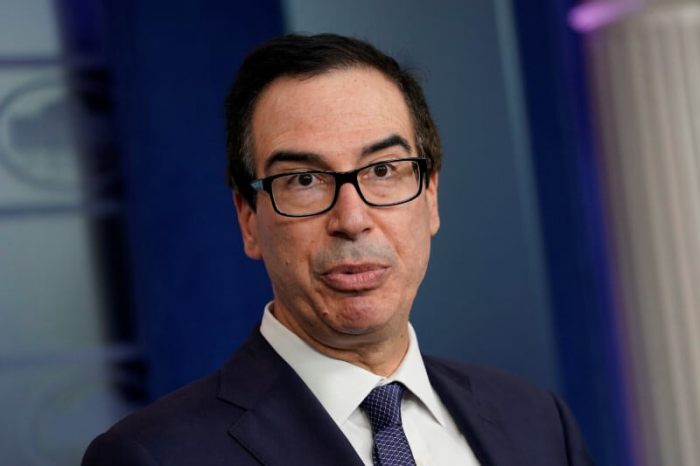By Rodrigo Campos
NEW YORK (Reuters) – Global stocks plunged into a bear market and oil slumped further on Thursday after stimulus efforts from the European Central Bank failed to calm investors alarmed by U.S. moves overnight to restrict travel from Europe over the spread of the coronavirus.
Trading was halted for 15 minutes shortly after the open in New York after the S&P 500 index fell more than 7%. It was recently trading down 6.8%.
U.S. President Donald Trump restricted certain travel from Europe to the United States in a televised address about the health crisis on Wednesday, shocking investors and travelers, and disappointing traders hoping to see broader measures to fight the virus.
“It’s not just the fear of the economy going weak, but basically being on the brink of shutting down,” said Dennis Dick, proprietary trader at Bright Trading LLC in Las Vegas.
“It’s mass selling across the board (and) we are pricing in a potential to go into another financial crisis.”
Trump said the United States would suspend all travel from Europe, except the United Kingdom and Ireland, for 30 days starting on Friday. He later said trade would not be affected by the restrictions.
Worry spread far beyond stocks, with concern building over companies’ lines of credit and their ability to finance activity in the short term.
The European Central Bank approved fresh stimulus measures and temporarily dropped banks’ capital requirements to help the euro zone cope with the shock of the pandemic, but kept interest rates on hold, disappointing markets.
The Dow Jones Industrial Average <.DJI> fell 1,905.67 points, or 8.09%, to 21,647.55, the S&P 500 <.SPX> lost 187.32 points, or 6.83%, to 2,554.06 and the Nasdaq Composite <.IXIC> dropped 490.83 points, or 6.17%, to 7,461.22.
The pan-European STOXX 600 index <.STOXX> lost 9.89% and emerging market stocks lost 6.63%. MSCI’s broadest index of Asia-Pacific shares outside Japan <.MIAPJ0000PUS> closed 5.78% lower, while Japan’s Nikkei <.N225> lost 4.41%.
MSCI’s gauge of stocks across the globe <.MIWD00000PUS> shed 7.40%, down more than 20% from its 52-week peak.
Investors also rushed into safe-haven assets, from bonds to the yen. Bitcoin plunged 25%, amid wild volatility in cryptocurrency markets. The VIX volatility index <.VIX> – Wall Street’s “fear gauge” – and an equivalent measure of volatility for the Euro Stoxx 50 <.V2TX> hit their highest levels since the 2008 financial crisis. Fed fund rate futures <0#FF:> are now pricing in a 1.0 percentage point cut, rather than 0.75, at a policy review next week.
The euro weakened after the ECB stimulus announcement.
Demand for dollars via the currency derivative markets surged to the highest levels in years in a sign that coronavirus-induced economic stress is starting to manifest itself in a broad scramble for funding in dollars. The dollar index <=USD> rose 0.996%, with the euro The Japanese yen weakened 0.54% versus the greenback at 105.14 per dollar, while Sterling Oil prices were also hit, compounded by an intensifying price war between Saudi Arabia and Russia, on top of fears of a sharp slowdown in the global economy.
U.S. crude Spot gold Among industrial metals, copper Benchmark 10-year notes (Reporting by Rodrigo Campos; additional reporting by Bozorgmehr Sharafedin, Saikat Chatterjee and Sujata Rao in London, Karen Pierog in Chicago, Medha Singh in Bengaluru and Kate Duguid and Saqib Iqbal Ahmed in New York)























